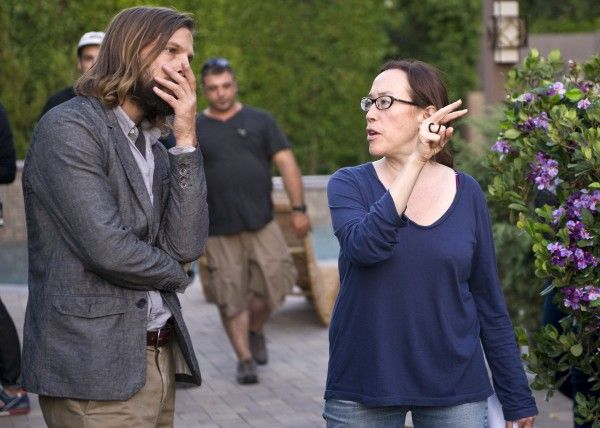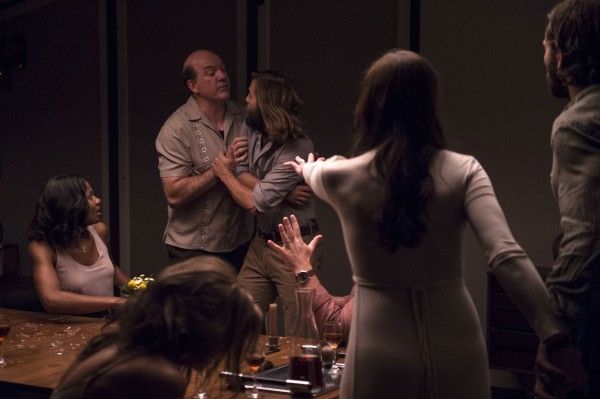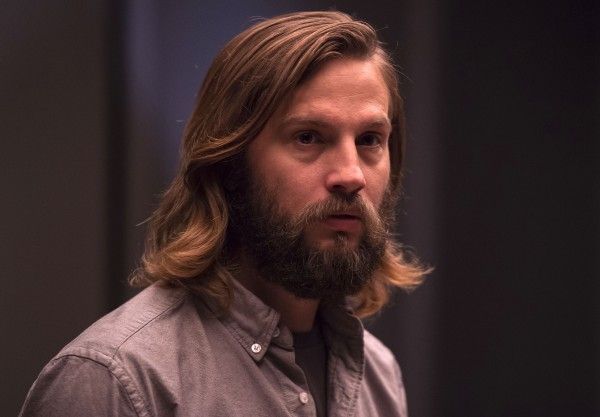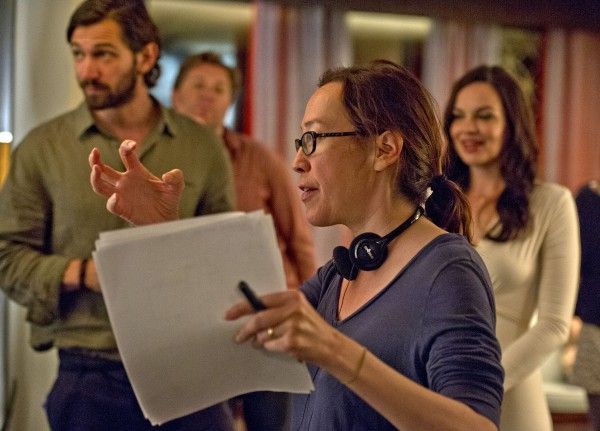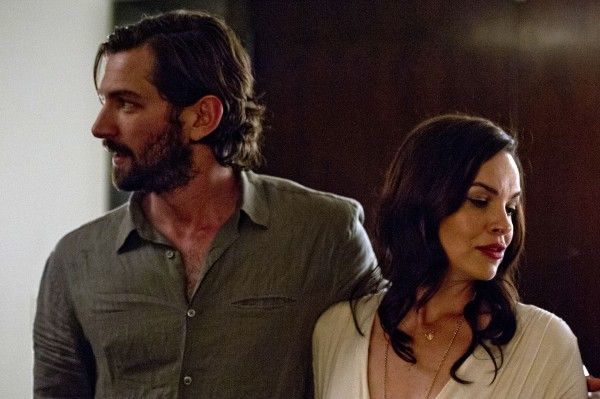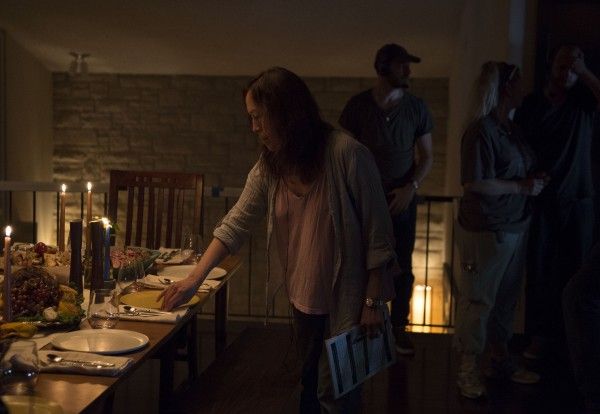Directed by Karyn Kusama (Girlfight, Jennifer’s Body) and written by Phil Hay and Matt Manfredi, the tension-filled psychological thriller The Invitation follows Will (Logan Marshall-Green), who shows up to a dinner party hosted by his ex-wife, Eden (Tammy Blanchard), and her new husband, David (Michiel Huisman), only to be reminded of the tragic past that haunts them. Suspicious behavior and mysterious house guests quickly convince Will that maybe his invitation was extended with a hidden agenda that he is driven to uncover.
During this exclusive phone interview with Collider, filmmaker Karyn Kusama talked about how she came to direct this script, what most spoke to her about the project, why she likes ambiguous endings, putting all of the puzzle pieces together in the right way, and cutting out the fat of the story. She also talked about what she’s looking to do next, her desire not to take as long of a break between films, and being a female director in the movie industry.
Collider: As this script was being written by your husband, Phil Hay, and his writing partner, Matt Manfredi, had you always planned on directing it, or did you want to read it first?
KARYN KUSAMA: What’s interesting is that he and his partner, Matt, were originally thinking that they would direct it, and they very sweetly like to say that they found somebody more qualified for the job, which I really appreciate, so much. But honestly, it was just that I felt so close to the script, as soon as I read it. I felt like it had this incredible economy precision and a real formal daring to just force the audience to squirm for so long. So for me, as soon as I read it, I said, “If you guys decide not to direct this, I would like to direct it.” They took that as a cue and decided to hand it over to me, and I was so thankful that they did.
What were the things that most spoke to you about the characters?
KUSAMA: What I appreciated about the script was that all the characters were just fuller than what I usually read, so there was more opportunity to really make them people. For me, I feel very close to a character like Will. There are times when I’m kind of anti-social, I’m just really shy and I don’t feel like I fit in, and I then attribute that to some emotional state that’s crippling me. My head can spin out, so I really appreciated watching this character spin out, a little bit. I felt tremendous sympathy for him because personally I feel like I’ve been there, and I suspect a lot of us have been in that place that he was in. It was interesting to me to explore a male character who’s grappling with these feelings of isolation, and of being watched and evaluated. I think that’s uncommon to see in a male character, and it’s really fascinating. I also have to say that I ultimately felt a lot of sympathy and empathy with all of the characters, even the ones who do some really fucked up things. I understand the power of sorrow, and I understand how far it can take us from ourselves, if we let it. In the end, that’s what the story is about. It’s about what it means to deny your sorrow, to the point that it deforms you into another self.
When you’re telling a story like this that’s more of a slow burn, you don’t really know what’s going to happen. You keep waiting for something to happen, but you’re not sure what that will be. By the time you get to the end, was it important to you that there be more of an ambiguous resolution that isn’t wrapped up with a bow?
KUSAMA: Yes. I like endings that are more open-ended and that ask even more questions than came before. I feel like there’s something about opening up those possibilities for an audience that are really freeing. The one thing that we all talk about, ironically, when we talk about grief, is this idea of closure. I think you can apply the same irrationality of that idea to storytelling. I don’t necessarily believe that stories need closure. I just believe they need a beginning, middle and end, but the end doesn’t have to prevent us from continuing to grapple with the story at hand. It ideally should demand that we remain engaged with the story. That’s the power of story. So, I definitely am more interested in those open-ended films that ultimately can allow the audience to have to think even more when they walk out of the theater.
This seems as though it would be a tricky story to tell effectively, with the tone, the ensemble cast, the limited locations, and making sure you tell a character story that’s part thriller and part horror. Where did you start? Was there a key to putting those puzzle pieces together, in the right way?
KUSAMA: That’s a really interesting question. I feel like I probably would have to say that it all came down to Will. It all came down to looking at this one guy who doesn’t want to be where he is and whose essential issue is a lack of presentness, and exploring this very, very simple tenant of the difference between being in the present and not being in the present, and how that expresses itself in that character. And then, it felt like, if I could stay focused on that crucial component of the storylines and really pay attention, emotionally, to how and why that’s happening, there will be a natural domino effect among the group. He’s the disrupter of the group. He’s the wet blanket who says, “Guys, I know you’re having a great time, but I’m just not.” That’s a very transgressive place to be, and I sympathize tremendously with it. Nobody wants to be the party pooper, but that’s what Will effectively is. And so, I felt like if I could organize the movie around his behavior and the audience’s engagement with and alienation from that behavior, a lot of other stuff would fall into place. On the one hand, we need him to be a sympathetic anchor for the film, but we also need to, at a certain point, understand that he’s not a very reliable narrator. It was a challenge to figure out that balance, but that’s how I had to start, in conceiving of the film, so that it had a whole quality.
Were there deleted scenes or storylines that, once you shot the film, you had to lose because it seemed more effective in paring it down?
KUSAMA: There certainly wasn’t a lot of fat in the script. It was very, very lean to begin with. But even with that said, we pared certain scenes down tremendously, to just their bare basics. They became much more effective and much more muscular when you felt like you were just getting a fragment of the story, as opposed to the whole story. So frequently, story is really filled in by the audience. Oftentimes, scripts make the mistake of trying to fill in all of the details for the audience, so we looked at those spaces where we felt like we didn’t need to tell the audience everything because they would figure it out on their own. There was maybe one major scene that we deleted, that included the fate of one of the characters. We realized that when we saw it in the cut, it gave away information at a moment when we didn’t need to give it away, and we were in better shape forcing the audience to keep living in doubt.
Do you have any idea what you’re going to do next, or what you’d like to do next?
KUSAMA: Phil and Matt are writing another script for me, which is just such a lovely thing to have happen. It’s a really interesting female character in a hybrid of an action drama and a cop story. It’s super interesting, and I hope that could be my next film. I’m also looking at other movies that just get into the muck of being alive. I’m excited to maybe not take four years between movies. We’ll see if that could happen.
Does the movie that Phil and Matt are writing have a title?
KUSAMA: It doesn’t yet. The title that they loved actually ended up being taken by another movie, so we’ll see where we land with it. Right now, I’m just titling it “Their Next Great Script.”
There’s always a lot of talk about how there aren’t enough female directors and how it’s hard for female directors to find opportunities. Have you found that to be the case, or is it more of a struggle for you to make the types of films you want to make, rather than your gender in making them?
KUSAMA: I ultimately have a lot of opportunities put in front of me, every day, and I’m thankful for them, but I’m dismayed by the fact that 99% of those opportunities aren’t the right ones for me. I just think that’s partially the nature of making art and of telling stories. You can’t fall in love with every single one, and I certainly don’t. I have very particular taste. Stuff that people assume I might be drawn to, I’m often like, “Nope, it doesn’t do it for me.” And then, I also think that the one thing that is true, overall, for female filmmakers is that their careers are looked at with a higher degree of scrutiny. There are some filmmakers, who happen to be male, whose every film does not need to be a huge success for them to keep making movies. I don’t necessarily think that’s the case for most women. I think most women have to fight very hard for the opportunities they want, which isn’t to say that most artists don’t have to do that, male or female, but I’m definitely aware of just how difficult it is to find stories that interest me, particularly.
The Invitation is in theaters and on VOD on April 8th.


